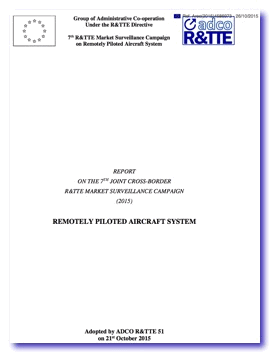Something CTIA and Wi-Fi Community Might Agree On

These days CTIA and the Wi-Fi community don't seem to agree on much due to the ongoing LTE-U/Wi-Fi controversy. But here is something that they are both likely to agree on for this weekend: Let's hope that FCC's total abdication of interest or responsibility for any aspect of drone spectrum issues does not result in spectrum chaos this weekend in the cellular bands and/or Wi-Fi bands, but possibly other bands if the drones marketed in the US are as noncompliant with spectrum emission rules as the drones marketed in Europe.
Readers may recall that we reported 10 days ago on the EU study shown at right that found high EMC noncompliance rates in the European market. Do you think Asian manufacturers are more careful with models destined for USA because they fear FCC enforcement?
This EU report observed what has been previously discussed here about the interference potential of drones that are not properly regulated:
So let's hope that the huge number of new drones that will be airborne this weekend do not result in spectrum chaos due to their location at altitudes that were not expected by cellular planners and Wi-Fi users or from out-of-band emissions. And let's hope that if they do cause interference that FCC will respond more quickly and decisively than it did in the case of "cellular boosters", police radar detector interference to VSATs, or the ongoing FM harmonic interference to 700 MHz LTE base stations - which FCC has never made a public pronouncement on.Signals transmitted from the air to the ground have a significantly bigger coverage area than from the ground. Therefore, interferences generated from RPAS could have a major impact on radio communication. This means that there is a higher risk of harmful interference if RPAS systems do not meet the essential requirements.
Perhaps serendipity might save the spectrum community this time from chaos. But really, is this the way to protect multibillion dollar industries that are deeply tied to our society and economy? Should we have an FCC that can pay attention to issues other than corporate merger review and finding more spectrum for cellular carriers?
After the holidays, readers might want to review my TPRC paper this year that deals with FCC productivity shortfalls in spectrum policy and argues that they result from BOTH resource shortages and an inability for the FCC's "8th Floor" to understand they have to delegate some issues more in order to keep up to the magnitude of their job in today's IT focused world. (General Motors board of directors does not review every design detail of next year's Chevy because they could not keep up with their strategic responsibility if they did. FCC's commissioners need to develop a more collegial relationship and decide which issues are "bottom line" for they and need limited availability en banc deliberations and which can be left to staff under agreed guidelines like Ofcom has with its staff.)
And let's all pray we avoid spectrum chaos this weekend. Best wishes to all for a happy holiday season!
blog comments powered by Disqus




![Validate my RSS feed [Valid RSS]](valid-rss-rogers.png)

